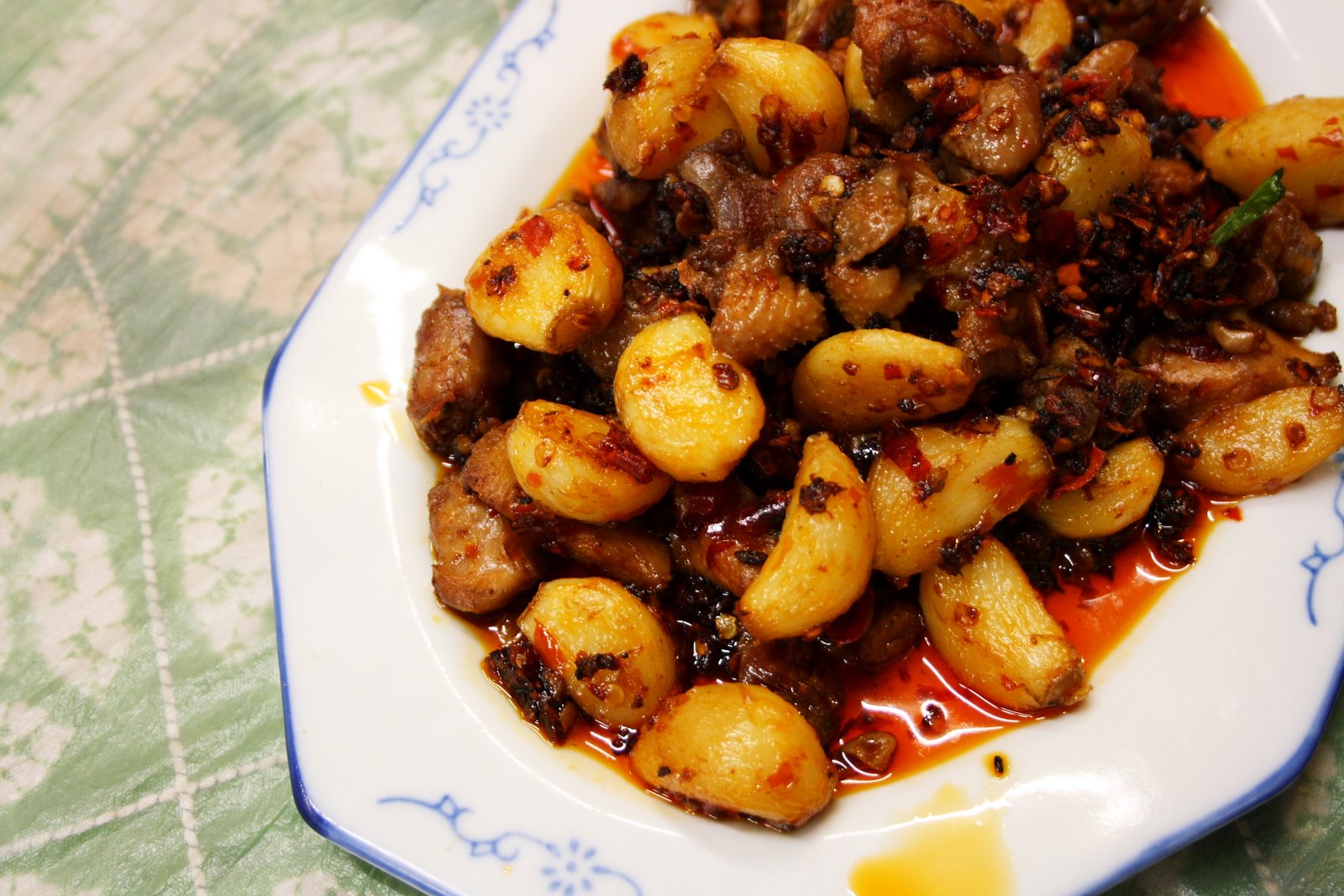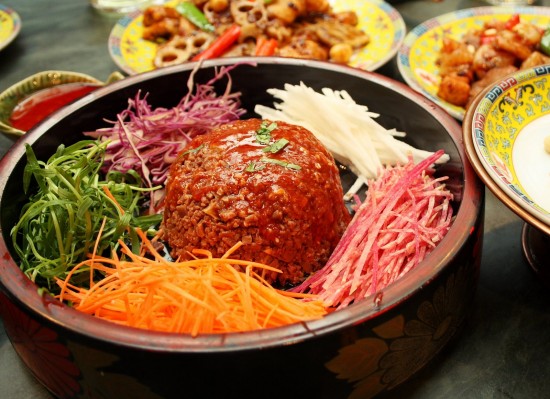This year, as last year, I was invited to be an expert on theBeijinger’s 2011 Restaurant Awards. Though sometimes the winners are rather consistent from year to year, the award ceremony is always fun to attend, and it’s interesting to see which new restaurant has managed to win the most hearts.
But alas, most of my favorite Chinese restaurants never win (a Sanlitun/Chaoyang-area location seems to be key to victory), so I have put together a short list of my picks for bests in Beijing. It doesn’t include all of theBeijinger’s categories – I’m omitting the ones I don’t know much about, and the ones for which I have nothing new to add. And I have some categories of my own – I can’t do a best picks without including my favorite cuisine, after all!
Guizhou
Though Da Gui (大贵) has some remarkable dishes, Jun Qin Hua (君琴花)’s traditional Guizhou dishes always hits the spot when I’m craving something spicy, pungent, and sour. Their mastery of the Guizhou fermented chili pepper (zaola jiao 糟辣椒) results in stir-fries that are simple yet deeply addictive with the unique, lightly boozy flavor of the peppers. The lazi ji (辣子鸡) is deceptively humble, with tender pieces of chicken buried beneath whole cloves of garlic and melt-in-your-mouth cubes of konjac root jelly (魔芋 moyu). It’s not as spicy as it looks: the smoky, golden-brown garlic mellows out the kick of chili pepper. Everything on the menu is delicious; this is my standby restaurant.
Yunnan
In my mind, Yunnan could conceivably be divided into two categories, one that focuses on the traditional cooking of Yunnan’s many minorities and regions, and “modern” Yunnan that plays with new ingredients and cooking styles. For the former, I love Bao Qin Dai Wei (宝琴傣味), by the Central University of the Minorities. With authentic, reasonably priced Dai food, it makes one of the best hong san duo (红三剁) and hei san duo (黑三剁) in Beijing (the more-popular Golden Peacock next door seems to do deep-fried potato balls better, though).
For the latter category, I admit to liking quite a few of the modern Yunnan restaurants, though they’re not memorable enough to justify the price tag (inflated, as always, for trendiness quotient and number of modern artists involved). Dianke Dianlai stands out for its fabulous spread of creative Yunnan food, with a variety of light, fresh dishes colorful in flavor and texture. It’s a great place to introduce friends to Yunnan.
Beijing
(Suddenly surprised that this is not an actual category!) For a proper meal, Liu Zha Shi Fu (刘宅食府) excels at homestyle Beijing dishes and treats; their mastery of simple dishes like cold cucumber or fried eggs and wood ear is mesmerizing. For xiaochi (小吃), I love Lao Ciqikou for their fermented bean juice douzhi (豆汁), and Baiji Niangao for their red-bean and sticky rice roll dusted with soybean flour (lüda gun, “donkey rolling in mud,” 驴打滚) and glutinous rice cakes (切糕 qiegao).
Sichuan
Jin Fu Yan Bang (锦府盐帮) amazes me every time with its menu from which I want to order everything. It specializes in the food of the salt merchants from Zigong – not surprisingly, every bite is a burst of flavor that goes well beyond the prickly peppercorn.
Noodles
The fresh, handmade buckwheat noodles at Xibei Youmian Cun (西贝莜面村) come in various forms and shapes, and can be steamed, boiled, or stir-fried. They’re perfectly al dente, with a wholesome nutty flavor and a springiness to every bite. My favorite is the 莜面窝窝 (youmian wowo), a honeycombed lattice of individual “tubes” of buckweat. Buckwheat noodles can also be found at Noodle Loft (面酷 Mianku), which specializes in excellent Shanxi noodles, including cat’s ears noodles and wide, chewy kudai mian (裤带面 “belt noodles”), and an excellent Chinese stout called Haidao Heipi (海岛黑皮).
Salads
One might naturally think about international restaurants here, but some Chinese restaurants also have excellent salads. Some of my favorites are the cold mint salad at almost any Yunnan restaurant but especially Yunteng Shifu (云腾食府) and Dianke Dianlai, and the salad I eat most often in Beijing, the da ban cai (大拌菜), a giant lettuce salad with cashews and a sweet peanut dressing at Fanqian Fanhou (饭前饭后).
Hot Pot
I’ve already said enough about why I love Ju Bao Yuan here.
Dim Sum
No place in Beijing does dim sum really well: the Sampan came close but it sadly closed with the demolition of the Gloria Hotel. Lei Garden impresses with many of its dim sum items, but fails when it comes to the classic changfen 肠粉, whose rice skins were tough and chewy instead of tender and silky.
Taiwanese
When I crave everyday Taiwanese food, I go to Fanqian Fanhou (饭前饭后), and when I’m feeling fancy, I go to Shin Yeh (欣叶), lured by their fresh peanut-dusted mochi bites and red-bean and turnip pastries. I’m not obsessed with Din Tai Fung’s soup dumplings, but I like their delicate vegetable buns, perfectly done stir-fried pea leaves (清炒豌豆尖 qingchao wandou jian), and exceptional shaved ice desserts.
Vegetarian
My affection is split evenly between some of the city’s best vegetarian restaurants: Still Thoughts (静思) and Lily’s Vegetarian (香草园) are both standbys, while Tianchu Miaoxiang (天厨妙香) is more of a special occasion due to its greater distance.
Most Impressive for Visitors
This one is easy: I always take guests to Na Jia Xiaoguan. The food definitely comes first, but Na Jia Xiaoguan also has a beautiful setting, like that of an old noble’s mansion. The wood-beamed decor and traditional wooden furniture are comfortable and majestic without being ostentatious; there are nice touches like greenery, talking mynah birds, and bronze wine pots. And the Manchu-inspired dishes, like braised venison, mashed lamb, and stuffed dates, are delicious and sophisticated.






































interesting list there! There are a few names I’ve been meaning to check out for a long time but never got around to it.
Na Jia Xiao Guan is pure absolute bliss
[...] planning on going to eat soon. To quote Haw Berries & Kumquats, their mastery of simple dishes like cold cucumber or fried eggs and wood ear is [...]